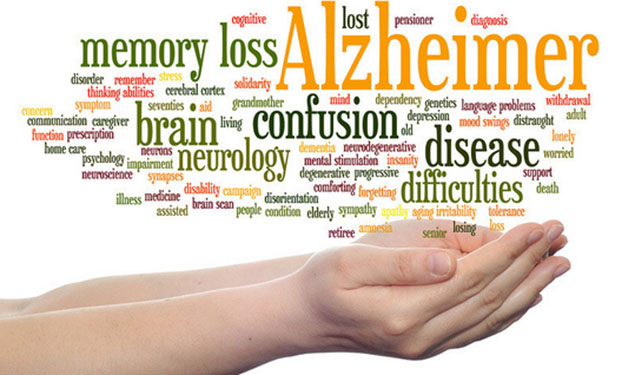Wondering if you should be concerned about Alzheimer’s or another type of dementia? If you observe any of these 10 classic warning signs (as noted by the Alzheimer’s Association), you should contact your physician. Why? Two reasons:
- Those symptoms could be a sign of a condition that resembles dementia but could be potentially reversed if identified and treated.
- There are many benefits to early detection of dementia.
Memory Changes
The first and most common warning sign is memory loss that interferes with daily life.1 This includes repeated requests for the same information, increased reliance on written notes or family members, and more difficulty with remembering recent events or information.
What it’s not: Occasionally forgetting where you placed the car keys.
While memory loss is often what comes to mind when we think of Alzheimer’s disease, there are nine other warning signs that are just as important.
Withdrawal From Usual Activities
Apathy, lack of interest, and withdrawal from people and activities around you can be indicative of early dementia.2
What it’s not: Needing a longer break between activities or occasionally feeling overloaded with obligations.
Disorientation to Time or Place
If you’ve ever awakened from a deep sleep and couldn’t immediately determine the day, time, or location, you’ve experienced disorientation. Magnify that many times over and you’ve got one of the warning signs of Alzheimer’s. Disorientation includes an inability to determine what season or year it is, your location, or why you’re in that location.3 As Alzheimer’s progresses, it’s not uncommon for the person to believe she’s many years younger than she is due to an unawareness of time passing.
What it’s not: Wondering what day it is and figuring it out by checking the calendar. What Does Oriented x1, x2, x3, and x4 Mean in Dementia?
Visual-Spatial Difficulties
Visual-spatial changes are another warning sign of dementia.4 This includes difficulty with depth perception and distances, recognition of familiar faces or objects, and interpretation of the images that we see. Activities including navigating stairs, climbing into a bathtub, finding your way home, or reading a book may become more difficult.
What it’s not: Vision changes due to macular degeneration or cataracts. How Dementia Affects Visuospatial Abilities and Skills
A decrease in Written or Verbal Communication Ability
Do you often find yourself trying to come up with the right word and have to settle for saying “the thing you cook food on” because the word “stove” just won’t come to you? Maybe you’ve always been a good writer and recently, you’re noticing that you can’t get your thoughts down on paper very well. A change in communication ability serves as a warning sign of dementia.5
Challenges in Problem-Solving and Planning
Maybe your memory seems fine to you, but balancing your checkbook and getting the bills paid on time has become much harder lately. Or you’ve always been a good cook, but the multiple steps in recipes don’t seem to make sense anymore. Even making coffee in the morning takes longer to figure out.
These activities involve executive functioning, an ability that typically declines in dementia.6
What it’s not: One or two mistakes in your math calculations. How Executive Functioning Is Affected by Dementia
Personality and Mood Changes
Has your normally easy-going father become irritable and fearful lately? Maybe he accused you of helping him clean his house just so you could take his money or steal his favorite treasures. Or, he had a catastrophic reaction when you drove him to the store and they had moved the bread to a different aisle.
If he’s always been temperamental or ornery, it’s unlikely that this is related to his cognitive functioning. However, a change over the last several months in his usual mood and behavior is a warning sign that his brain may be experiencing some changes, and he should be evaluated for dementia.7
What it’s not: Becoming a little more “set in your ways” and disliking changes. Personality Changes in Alzheimer’s:
Misplacing Items Frequently
Know someone who struggles to keep track of things? In dementia, this is exponentially increased.8 Not only might things be misplaced, but the process of looking for the item by retracing her steps is much more difficult. The person with dementia may become frustrated because “someone” put her eyeglasses in the freezer or “took” her purse. Not only can she not find her shoes, but she also has no recollection as to how they got in the oven.
What it’s not: Losing your keys and them later remembering you set them down on the piano to answer your phone.
Decline in Judgment
If you’ve noticed a pattern of poor judgment lately in your loved one, it’s time to schedule an appointment with a physician.9 Perhaps it’s repeatedly getting taken by phone scams and giving money away, or your normally neatly-groomed mother often looks disheveled and needs a shower. You might also notice that she is not appropriately dressed for the weather.
What it’s not: The occasional questionable decision with which a loved one disagrees. Impaired Judgment Can Be an Early Symptom of Dementia
Difficulty Performing Familiar Tasks
Getting lost on your way home from the local grocery store, an inability to perform the job you’ve had for 20 years or difficulty making your signature grilled cheese are warning signs of Alzheimer’s disease or another type of dementia.1
It’s important to recognize that this isn’t referring to attempting to learn something new, such as a new computer system, but rather is a change in the ability to complete a task you’ve always been able to perform until now.
What it’s not: Difficulty in figuring out and using the new television remote control.


